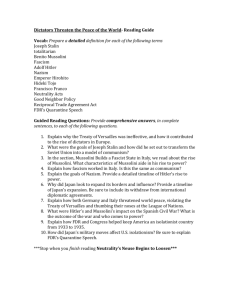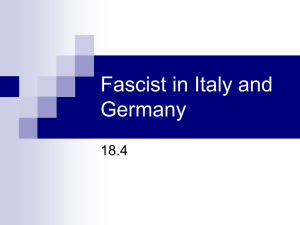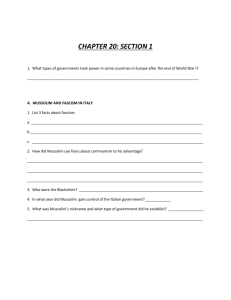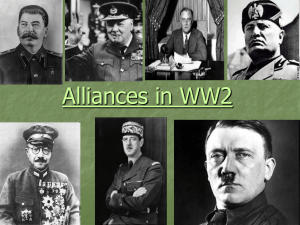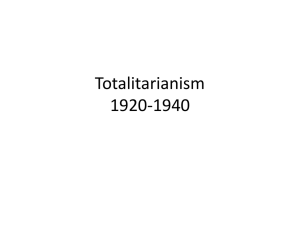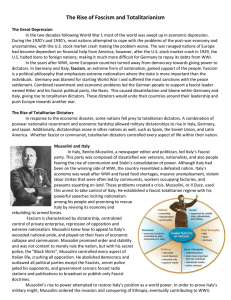File
advertisement
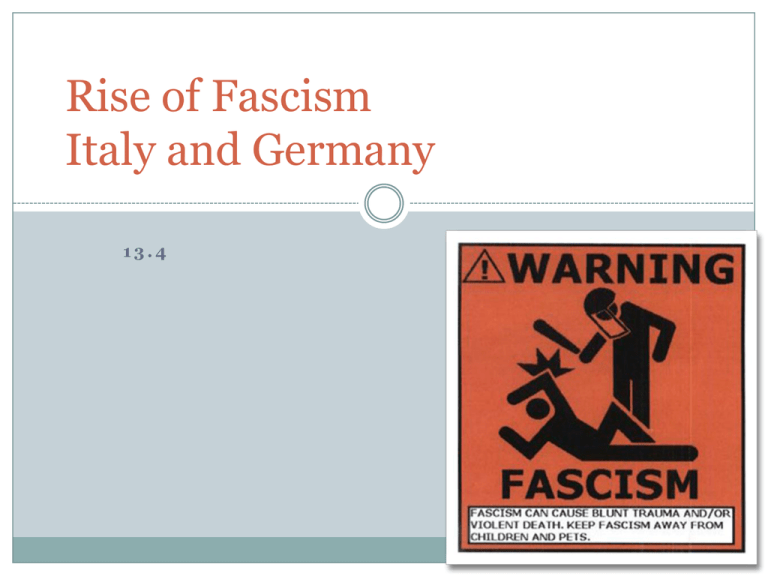
Rise of Fascism Italy and Germany 13.4 What is Fascism? Militant political movement that emphasizes loyalty to the state and obedience to its leader Extreme form of nationalism Advocates social Darwinism Glorification of war Italy Rise of Fascism in Italy Italy denied major concessions in Treaty of Versailles Economic troubles led to fear of communism Benito Mussolini gains popularity for anti-socialist views through Fascist Party Mussolini’s Rise to Power Il Duce Mussolini’s Blackshirts terrorize enemies March on Rome (10/1922) Mussolini and supporters demand change in government King allows Mussolini to form own government to save economy Mussolini’s Economic System Capitalism exists but in service to the state Everything in the state, nothing outside the state, nothing against the state Labor unions now controlled by the government Authority comes from the top, not amongst the workers Mussolini’s “Dictatorship” OVERALL – Limited power because… Presence of the king No ruthless police state Old conservative power structure remains However… Few voting rights and political choices Government-regulated leisure time Women remain in traditional roles Positives? Electrification and road building Suppression of the Mafia Lateran Pact (1929) – Peace with the Church Vatican City created Church recognizes Italian gov’t Nazi Germany What is Nazism? Nazism = extreme nationalism + racism Rise of Adolf Hitler Becomes leader of Nazi party post-WW1 Unsuccessfully leads Beer Hall Putsch, lands in jail, writes Mein Kampf IDEAS Germans should expand east, need lebensraum Aryans (Germans) are the master race, non-Aryan races are inferior The “Fuhrer” of Germany should have unlimited power Economic Crisis Germany recovers in 1920s, make Hitler look stupid Great Depression wrecks economy Hitler’s Nazis start preaching salvation for German people with their control Nazis become most popular party by 1933 Hitler in Power Hitler named Chancellor in 1933, seeks Nazi majority Reichstag burns…blamed on Communist parties Enabling Act gives Chancellor unlimited powers Nazi Party only legal political party Strikes, labor unions outlawed Freedom of knowledge and information limited Establishment of Third Reich Night of Long Knives (June 1934) Members of the S.A. murdered by Hitler’s elite personal guard – the S.S. S.S. pledges loyalty to HITLER, not Germany S.S. combines with Gestapo to form police state The Fuhrer’s Propaganda JOSEPH GOEBBLES Burned and banned books that did not conform to Nazi ideology Churches forbidden to criticize the government Schoolchildren forced to join the Hitler Youth (boys) or League of German Girls Nazi Propaganda Economic Recovery Major reason for Hitler’s popularity Large public works program and massive rearmament Results Unemployment – 6 million to 1 million in three years Standard of living rises incredibly by 1938 Role of Women Stay at home and MAKE BABIES Only in wartime were women encouraged to work




